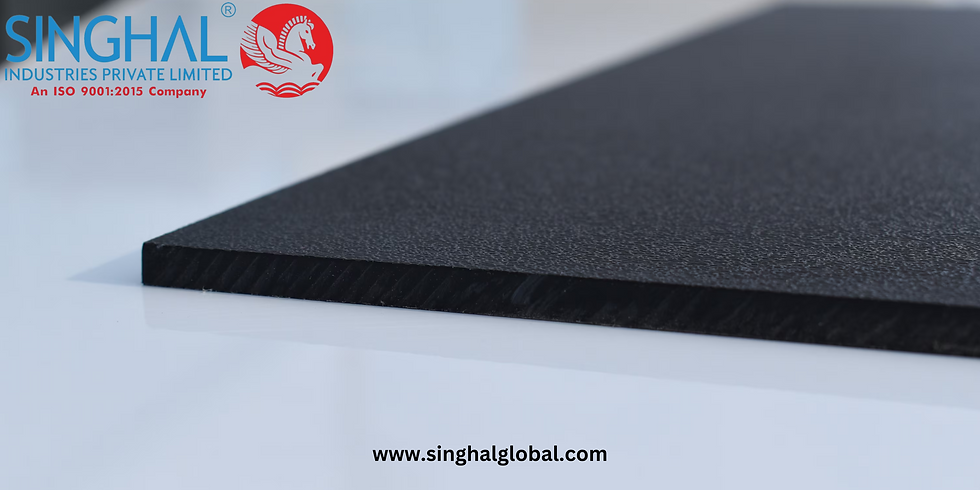Exploring the Benefits of Plastic Carry Bags
- Deepak Karola
- Aug 10, 2023
- 4 min read

While clear plastic carry bags have received criticism for their environmental impact, they do offer certain benefits that have contributed to their widespread use. It's important to consider both sides of the issue. Some of the benefits of plastic carry bags include:
Convenience and Portability: Plastic bags are lightweight and easy to carry, making them convenient for consumers to transport their purchases. Their compact size allows stores to offer customers a practical way to carry their items.
Durability: Plastic bags are relatively strong and resistant to tearing, making them suitable for carrying a variety of goods, including heavier items. This durability can help prevent items from spilling or getting damaged.
Cost-Effectiveness: Plastic bags are cheaper to produce compared to many alternative materials, such as paper or cloth. This cost-effectiveness can be beneficial for both businesses and consumers.
Water and Moisture Resistance: Plastic bags are water-resistant, protecting items from rain or other sources of moisture. This can be particularly useful for carrying groceries or other perishable goods.
Reduced Carbon Footprint in Production: The production of plastic bags generates lower greenhouse gas emissions compared to the production of certain alternative materials like paper bags, which require more energy and resources during manufacturing.
Sanitary Benefits: Plastic bags can provide a hygienic barrier between purchased items and the consumer, which can be especially important for carrying items like raw meat or cleaning products.
Reuse and Multi-Purpose: Plastic bags can be reused for various purposes, such as lining trash bins, packing items, or even as makeshift rain covers. This can extend the useful life of the bags before they are disposed of.
Recyclability Potential: While often criticized for their low recycling rates, plastic bags can be recycled into new plastic products if collected and processed properly. Some regions have established recycling programs for plastic bags.
Energy Savings in Transportation: Due to their lightweight nature, plastic bags can contribute to energy savings during transportation, as they add minimal weight to shipments compared to heavier packaging materials.
Space-Efficient Storage: Plastic bags can be easily stored in homes, vehicles, and retail spaces due to their compact and flexible nature.
Versatile Design Options: Plastic bags can be manufactured in various sizes, shapes, and colors, allowing businesses to customize their bags to match branding or seasonal themes.
It's important to acknowledge that while plastic carry bags offer these benefits, their overall impact on the environment and ecosystems remains a significant concern. Efforts to balance convenience with environmental responsibility have led to the exploration of alternative materials and strategies for carrying goods.
Plastic carry bags have certain benefits that have contributed to their popularity and widespread use. It's important to consider these benefits while also recognizing the environmental concerns associated with plastic bags. Some of the benefits of plastic carry bags include:
Affordability: Plastic bags are generally cheaper to produce than many other types of bags, such as cloth or paper bags. This cost-effectiveness can benefit both retailers and consumers.
Convenience: Plastic bags are lightweight and easy to carry, making them convenient for shoppers to transport their purchases. Their compact size allows for easy storage and distribution in stores.
Durability: Plastic bags are resistant to tearing and can handle a variety of items, including heavier or bulkier products. This durability can prevent items from spilling or breaking during transportation.
Water-Resistance: Plastic bags are water-resistant, helping to protect items from rain or moisture. This is especially useful for carrying groceries, beverages, and other goods that might be sensitive to water damage.
Hygiene: Plastic bags provide a barrier between purchased items and the consumer, which can be important for containing odors, preventing cross-contamination between products, and maintaining cleanliness.

Versatility: clear plastic carry bags come in various sizes, shapes, and colors, allowing businesses to customize them for branding purposes or to differentiate between different types of products.
Reuse: Plastic bags can be reused for various purposes, such as storing items, lining trash bins, or packing lunches. This extends their usefulness beyond the initial shopping trip.
Recyclability: While recycling rates for plastic bags have historically been low, they can be recycled into new plastic products when collected and processed correctly. Some areas have established recycling programs for plastic bags.
Lightweight: Plastic bags add minimal weight to shipments, making them more energy-efficient to transport compared to heavier packaging materials. This can contribute to reduced transportation costs and emissions.
Storage Efficiency: Plastic bags are compact and take up minimal space when stored in homes, vehicles, or retail spaces.
Prevention of Food Waste: Plastic bags can help preserve the freshness of perishable items like fruits and vegetables, potentially reducing food waste.
Protection of Delicate Items: Plastic bags can provide a protective layer for fragile or breakable items, preventing them from getting damaged during transportation.
Advertising and Branding: Retailers often use plastic bags as a means of advertising by printing their logos, slogans, or promotional messages on the bags, which can enhance brand visibility.
While plastic bags offer these advantages, it's essential to weigh them against the negative environmental impact of plastic pollution. Balancing convenience and practicality with environmental responsibility has led to increased efforts to reduce plastic bag usage and promote more sustainable alternatives.



Comments